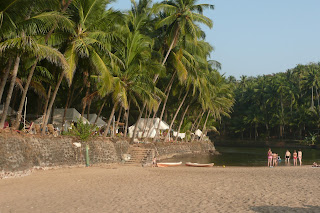My guide has pulled it off again. During the long journey to
get here I may have had a few doubts, but Pachmarhi is definitely worth the
trek. This is our third visit to Madhya Pradesh, and P is its only hill station;
very popular with Indian tourists, but like other places we visited in the
state, not frequented by western tourists. Maybe because it takes a certain
amount of some effort to get here. Few people speak English and the food is
characteristically HOT...you know you’re in the middle of India
After the busyness
of Bhopal
The most surprising walk was to the five caves from
which Pachmarhi gets its name. (Panch means five). According to legend, the Pandavas
from the mythical saga, the Mahabharata, spent their exile in these caves. After
seeing Ellora and Ajunta, these caves were merely holes carved out of the rock…not
impressive.
But the flower gardens at the base of the hill were spectacular!
We’re unaccustomed to seeing anything flowering in India
The guidebook talks about “the faded Raj
atmosphere” - and at first it looked as if it had faded completely out of sight. But these gardens, a few bungalows, and a
neogothic church confirmed the presence of the Raj.
Hearing an Indian tourist describe the thundering waterfall
in nearby Bhedaghat, we decided to leave Pachmarhi a day early to visit
it. Bhedaghat is three hours up the
train line we were taking to Varanasi
Then at Piparyia we made the mistake of buying “general
seating” tickets. It was a simpler transaction…and we were only going three
hours. How bad could it be? But we’d never ridden unreserved general
seating before. It was so crowded we
couldn’t even board much less find a seat.
So hoping no one would notice, we jumped into a “sleeper” coach, one
class higher. But this was no better, once again reserved seating was almost as
crowded as general seating, and no one wanted to make room for us.
So we ended up standing in the corridor
beside the toilets leaning against our cases.
After a while some boys invited Gerard to sit with them in a cramped
space beside the door. I sat on my case
wedged in beside a sleeping boy, trying to avoid tripping up the continual flow
of food vendors, blind beggars and passengers using the toilets. Then three
railway employees came and reclaimed their precious space on the ground
ordering the boys, including Gerard to leave so they could sit down and eat
their lunch. We were both leaning on our cases again. After they finished eating, the railway employees
took pity on us and ordered two young boys sharing a pull out seat against the
window to get up and let the old Western tourists sit down. Reluctantly they relinquished their seat and
for the rest of the journey we perched on it together…and grateful. The next time we see overcrowded trains with
people sitting in the doorway we will much more empathy for their situation.
After three long hours it was a relief to disembark in Jabalpur

































